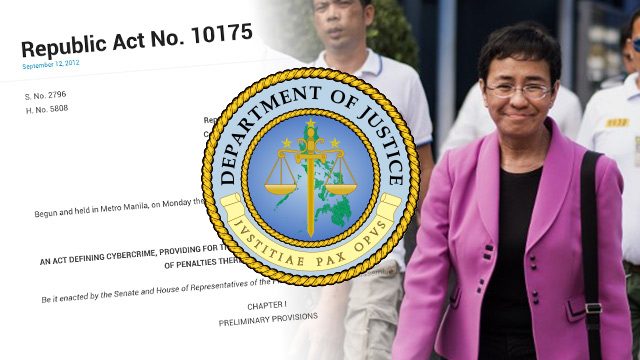SUMMARY
This is AI generated summarization, which may have errors. For context, always refer to the full article.

MANILA, Philippines – The Department of Justice (DOJ) has recommended the filing in court of cyber libel charges against Rappler Incorporated, its CEO and executive editor Maria Ressa, and former researcher Reynaldo Santos Jr over a story published in May 2012 – 4 months before the law that they allegedly violated was enacted.
In a January 10 decision that Rappler obtained on Monday, February 4, 3 DOJ prosecutors ruled in favor of businessman Wilfredo D. Keng, who first complained at the National Bureau of Investigation (NBI) in October 2017 over what he said was a malicious story written by Santos and published by Rappler on May 29, 2012, at the height of the impeachment trial of then-chief justice Renato Corona.
The story named Keng as the owner of the SUV that Corona had used during the impeachment. Keng complained not about his alleged ownership of the vehicle but about the backgrounder on him as having alleged links to illegal drugs and human trafficking, based on intelligence reports. In that report, Rappler linked to Keng’s denial written by former Inquirer columnist Ramon Tulfo.
Seven years after the story came out, Keng went to the NBI on October 11, 2017, and filed a formal affidavit on January 10, 2018.
The NBI Cybercrime Division under Manuel Antonio Eduarte dismissed the complaint on February 22, 2018, for lack of basis. The one-year prescription for the filing of libel had long ago lapsed, the NBI said.
Over a week after, on March 2, the same division revived the complaint and filed it with the DOJ on the basis of a supplemental affidavit supposedly filed by Keng on February 28, 2018.
Keng had argued that because Rappler updated the report on February 19, 2014, a crime still happned after the enactment of Republic Act 10175 or the Cybercrime Prevention Act of 2012.
Eduarte later said that, even if the prescription period had lapsed and that criminal laws do not apply retroactively, Rappler could be held liable due to the theory of “continuous publication.”
The DOJ invoked the same theory in its resolution, which was signed by Senior Assistant State Prosecutor Edwin Dayog and assistant state prosecutors Florencio dela Cruz Jr and Jeannette Dacpano and approved by Senior Deputy State Prosecutor Richard Anthony Fadullon.
‘Multiple publication’
The revived NBI complaint originally included as respondents, aside from Ressa and Santos, 6 members of Rappler’s 2016 Board of Directors, namely: Glenda M. Gloria, Manuel Ayala, Nico Jose Nolledo, James Bitanga, Felicia Atienza, and Dan de Padua, as well as its corporate secretary at the time, Jose Maria Hofileña.
The DOJ dismissed the complaint against the 6 and Hofileña and decided to bring to court only Ressa, Santos, and Rappler Incorporated.
The DOJ falsely described Ressa as “being the editor” of the story that was published. She was not.
“This indictment is evidence that the law has been weaponized: the NBI’s own lawyers recommended the case be thrown out, and the prosecutors wrongly named me an editor,” Ressa said in a statement Monday.
The DOJ resolution came barely two months after the same department indicted Rappler Holdings and Ressa for tax evasion charges before the Court of Appeals. Ressa appealed that decision, but the DOJ dismissed it.
In their response to the cyber libel complaint, Ressa and Santos argued that the cyber crime law did not differentiate cyber libel from the ordinary crime of libel penalized under Article 355 of the Revised Penal Code.
Ressa cited a Supreme Court resolution on the cybercrime law: “But, again, online libel is not a new crime. It is essentially the old crime of libel found in the 1930 Revised Penal Code (RPC) and transposed to operate in the cyberspace.”
Since they’re the same, Ressa said Article 90 of the RPC extinguishes criminal liability within one year.
“Since it has already been more than five (5) years after the said article was published and almost three (3) years after it was updated, and, to date, no complaint has been filed with any prosecutor with regard to the publication of the said article, then it is obvious that the crime of libel has already been totally extinguished by prescription,” Ressa said.
Rappler maintained that the cases were all triggered by President Rodrigo Duterte’s attack against the company in 2017.
In its resolution on the cyber libel charges, the DOJ said the story was “clearly defamatory” to Keng.
Citing the principle of “multiple publication rule,” the DOJ used as basis for the charges the fact that the story, while written in 2012, was revised on February 19, 2014, based on the published timestamp attached to the story.
The “republication” may have “modified” the story and it is a “distinct offense for which Santos should be prosecuted,” the DOJ said.
The story was modified to correct a typographical error, as can be seen in Rappler’s internal content management system.
Rappler’s counsel, JJ Disini, said the resolution is dangerous for media and bloggers.
“If the theory is that if a libelous article is published in the past, and continues to be accessible today, and that constitutes libel today, then no one is safe. Anyone that has a libelous article that continues to be accessible may be charged with libel, and, moving forward, this affects everyone, not just media, even bloggers,” Disini said. – Rappler.com
Add a comment
How does this make you feel?
There are no comments yet. Add your comment to start the conversation.